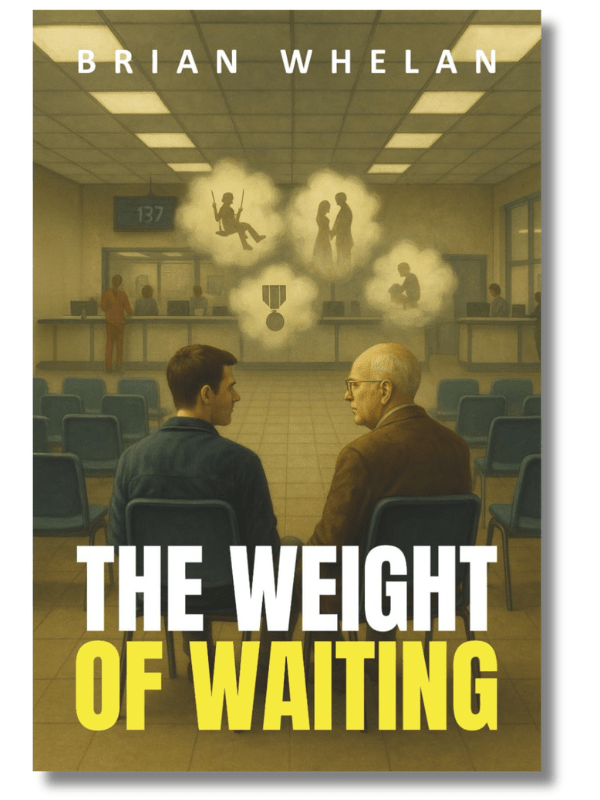The Weight of Waiting
by Brian Whelan
Genre: Literary Fiction
ISBN: 9798290350790
Print Length: 55 pages
Reviewed by Eric Mayrhofer
The Weight of Waiting takes the interminable suffering of the DMV and transforms it into the fertile soil where small, quiet, and meaningful connections grow.
At the beginning of Brian Whelan’s The Weight of Waiting, readers meet Jake Morrison, a young man who feels like he’s peaked at the age of 32—a grim prospect indeed. He’s impatient and cold. While sitting through the agonizingly slow wait at his local DMV, he sees an old man struggling with a ruined umbrella, and instead of sympathy or a compulsion to help, he thinks “‘What the hell is he doing?’…appalled by the man’s lethargic incompetence.”
But when Jake has (what he believes to be) the misfortune of having to engage with this old man, he learns that Harry Brennan is far from an inconvenience. Instead, he’s a font of wisdom who shows, through his warmth and sadness, his insight and regrets, that Jake’s despair over his own problems isn’t eternal, and that the wall of hyper-independence he’s built needs to crack—and break—in order for him to lead the whole and happy life he yearns for.
Whelan’s book is a charming one. Jake’s life transforms in such a mundane place and all because of conversations with strangers: both Harry and Stephanie, an increasingly involved third participant in their conversation. A thing like this could happen to any of us.
Jake’s revelations come in the quiet, like when Harry describes his late wife, he says, “She was…the smartest person in the room, but she never made anyone feel stupid for not keeping up. That’s a rare quality in smart people.” This small moment of vulnerability makes Jake think differently of interactions with his ex-girlfriend Taylor, who held him accountable for his impatience with people who didn’t understand ideas as quickly, and for using “his intelligence as a weapon rather than a tool.” He admits to himself that “at the time, he’d dismissed her criticism as oversensitivity,” but that “now, sitting next to Harry, he wondered if she’d been trying to tell him something important about himself.” These and other realizations throughout show not only a satisfying character arc, but a deft portrayal of a character with real depth, someone defined by his forced, callous disregard of others yet also in possession of a willingness to be vulnerable and a yearning to heal.
While Jake’s growth is inspiring, readers may also find the book’s portrayal of connection a bit one-sided. Throughout, Harry shares vulnerable feelings about his past, his family—even his high-stakes insecurities about visiting the DMV. For Harry, being able to renew his license “wasn’t just about renewing a license—it was about maintaining his autonomy, his ability to navigate the world on his own terms.” As for his family, he shares that, with his wife gone and daughter grown, he finds himself unsure of what his purpose is. It’s admirable to see Jake ask questions, unearth these feelings, and be there as Harry prepares for his turn at the DMV counter; however, most of Harry’s deep admissions serve primarily to help Jake grow and heal without equally deep inspiration for Harry. Harry is sweet, warm, and wise—it may be naive on my part, but I wished for more of his own reimagining of his future.
The Weight of Waiting is a tender and empathetic look at how life can seem like a dead end until you find someone to show you the long, hopeful way. This thing is well worth the read.
Thank you for reading Eric Mayrhofer’s book review of The Weight of Waiting by Brian Whelan! If you liked what you read, please spend some more time with us at the links below.
The post Book Review: The Weight of Waiting appeared first on Independent Book Review.
